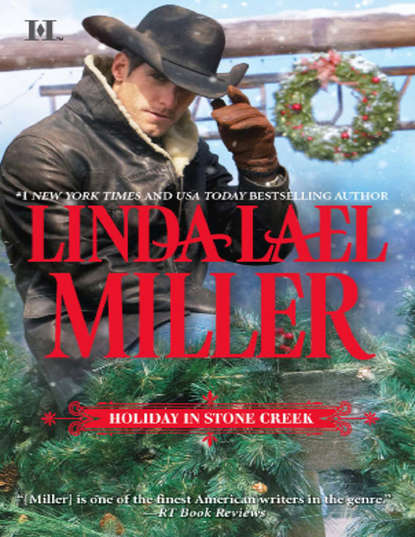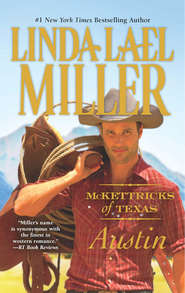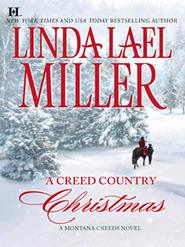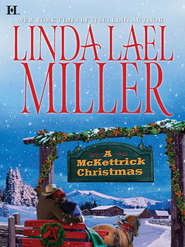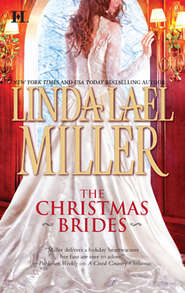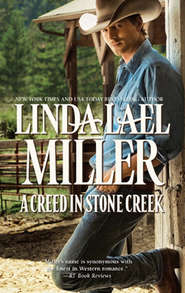По всем вопросам обращайтесь на: info@litportal.ru
(©) 2003-2025.
✖
Holiday in Stone Creek: A Stone Creek Christmas
Автор
Год написания книги
2019
Настройки чтения
Размер шрифта
Высота строк
Поля
“All right, Tanner,” she said. “This barn is a disgrace. When are you going to have the roof fixed? If it snows again, the hay will get wet and probably mold….”
He chuckled, shifted a little. He’d have a crew out there the following Monday morning to replace the roof and shore up the walls—he’d made the arrangements over a week before—but he felt no particular compunction to explain that. He was enjoying her ire too much; it made her color rise and her hair fly when she turned her head, and the faster breathing made her perfect breasts go up and down in an enticing rhythm. “What makes you so sure I’m a greenhorn?” he asked mildly, still leaning on the gate.
At last she looked straight at him, but she didn’t move from Butterpie’s side. “Your hat, your boots—that fancy red truck you drive. I’ll bet it’s customized.”
Tanner grinned. Adjusted his hat. “Are you telling me real cowboys don’t drive red trucks?”
“There are lots of trucks around here,” she said. “Some of them are red, and some of them are new. And all of them are splattered with mud or manure or both.”
“Maybe I ought to put in a car wash, then,” he teased. “Sounds like there’s a market for one. Might be a good investment.”
She softened, though not significantly, and spared him a cautious half smile, full of questions she probably wouldn’t ask. “There’s a good car wash in Indian Rock,” she informed him. “People go there. It’s only forty miles.”
“Oh,” he said with just a hint of mockery. “Only forty miles. Well, then. Guess I’d better dirty up my truck if I want to be taken seriously in these here parts. Scuff up my boots a bit, too, and maybe stomp on my hat a couple of times.”
Her cheeks went a fetching shade of pink. “You are twisting what I said,” she told him, brushing Butterpie again, her touch gentle but sure. “I meant…”
Tanner envied that little horse. Wished he had furry hide, so he’d need brushing, too.
“You meant that I’m not a real cowboy,” he said. “And you could be right. I’ve spent a lot of time on construction sites over the last few years, or in meetings where a hat and boots wouldn’t be appropriate. Instead of digging out my old gear, once I decided to take this job, I just bought new.”
“I bet you don’t even have any old gear,” she challenged, but she was smiling, albeit cautiously, as though she might withdraw into a disapproving frown at any second.
He took off his hat, extended it to her. “Here,” he teased. “Rub that around in the muck until it suits you.”
She laughed, and the sound—well, it caused a powerful and wholly unexpected shift inside him. Scared the hell out of him and, paradoxically, made him yearn to hear it again. “That would be a little drastic,” she said.
Tanner put his hat back on. “You figure me for a rhinestone cowboy,” he said. “What else have you decided about me?”
She considered the question, evidently drawing up a list in her head.
Tanner was fascinated—and still pretty scared.
“Brad told me you were widowed,” she said finally, after mulling for a while. “I’m sorry about that.”
Tanner swallowed hard, nodded. Wondered how much detail his friend had gone into, and decided not to ask. He’d told Brad the whole grim story of Kat’s death, once upon a time.
“You’re probably pretty driven,” Olivia went on, concentrating on the horse again. “It’s obvious that you’re successful—Brad wouldn’t have hired you for this project if you weren’t the best. And you compartmentalize.”
“Compartmentalize?”
“You shut yourself off from distractions.”
“Such as?”
“Your daughter,” Olivia said. She didn’t lack for nerve, that was for sure. “And this poor little horse. You’d like to have a dog—you like Ginger a lot—but you wouldn’t adopt one because that would mean making a commitment. Not being able to drop everything and everybody and take off for the next Big Job when the mood struck you.”
Tanner felt as though he’d been slapped, and it didn’t help one bit that everything she’d said was true. Which didn’t mean he couldn’t deny it.
“I love Sophie,” he said grimly.
She met his gaze again. “I’m sure you do. Still, you find it easy enough to—compartmentalize where she’s concerned, don’t you?”
“I do not,” he argued. He did “compartmentalize”—he had to—but he sure as hell wouldn’t call it easy. Every parting from Sophie was harder on him than it was on her. He was the one who always had to suck it up and be strong.
Olivia shrugged, patted the pony affectionately on the neck and set aside the brush. “I’ll be back tomorrow,” she told the animal. “In the meantime, think good thoughts and talk to Shiloh if you get too lonesome.”
Tanner racked his brain, trying to remember if he’d told Olivia the gelding’s name. He was sure it hadn’t come up in their brief but tempestuous acquaintance. “How did you…?”
“He told me,” Olivia said, approaching the stall door and waiting for him to step out of her way, just like before.
“Are you seriously telling me I’ve got Mr. Ed in my barn?” he asked, moving aside so she could pass.
She crossed to Shiloh’s stall, reached up to stroke his nose when he nuzzled her and gave a companionable nicker. “You wouldn’t understand,” she said, with so much smug certainty that Tanner found himself wanting to prove a whole bunch of things he’d never felt the need to prove before.
“Because I compartmentalize?” Tanner gibed.
“Something like that,” Olivia answered blithely. She turned from Shiloh, snapped her fingers to attract the dog’s attention and started for the barn door.
“See you tomorrow, if you’re here when I come by to look in on Butterpie.”
Utterly confounded, Tanner stood in the doorway watching as Olivia lowered a ramp at the back of the Suburban for Ginger, waited for the dog to trot up it, and shut the doors.
Moments later she was driving off, tooting a merry “so long” on the horn.
THATNIGHTHEDREAMED of Kat.
She was alive again, standing in the barn at Butterpie’s stall gate, watching as the pony nibbled hay at its feeder. Tall and slender, with long dark hair, Kat turned to him and smiled a welcome.
He hated these dreams for being dreams, not reality. At the same time he couldn’t bring himself to wake up, to leave her.
The settings were always different—their first house, their quarters in the American compound in some sandy, dangerous foreign place, even supermarket aisles and gas stations. He’d be standing at the pump, filling the vehicle de jour, and look up to see Kat with a hose in her hand, gassing up that old junker she’d been driving when they met.
He stood at a little distance from her, there in the barn aisle, well aware that after a few words, a few minutes at most, she’d vanish. And it would be like losing her all over again.
She smiled, but there was sadness in her eyes, in the set of her full mouth. “Hello, Tanner,” she said very softly.
He couldn’t speak. Couldn’t move. Somehow he knew that this visit was very different from all the ones that had gone before.
She came to stand in front of him, soft as summer in her white cotton sundress, and touched his arm as she looked up into his face.
“It’s time for me to move on,” she told him.
No.
The word swelled up inside him, but he couldn’t say it.
And Kat vanished.





